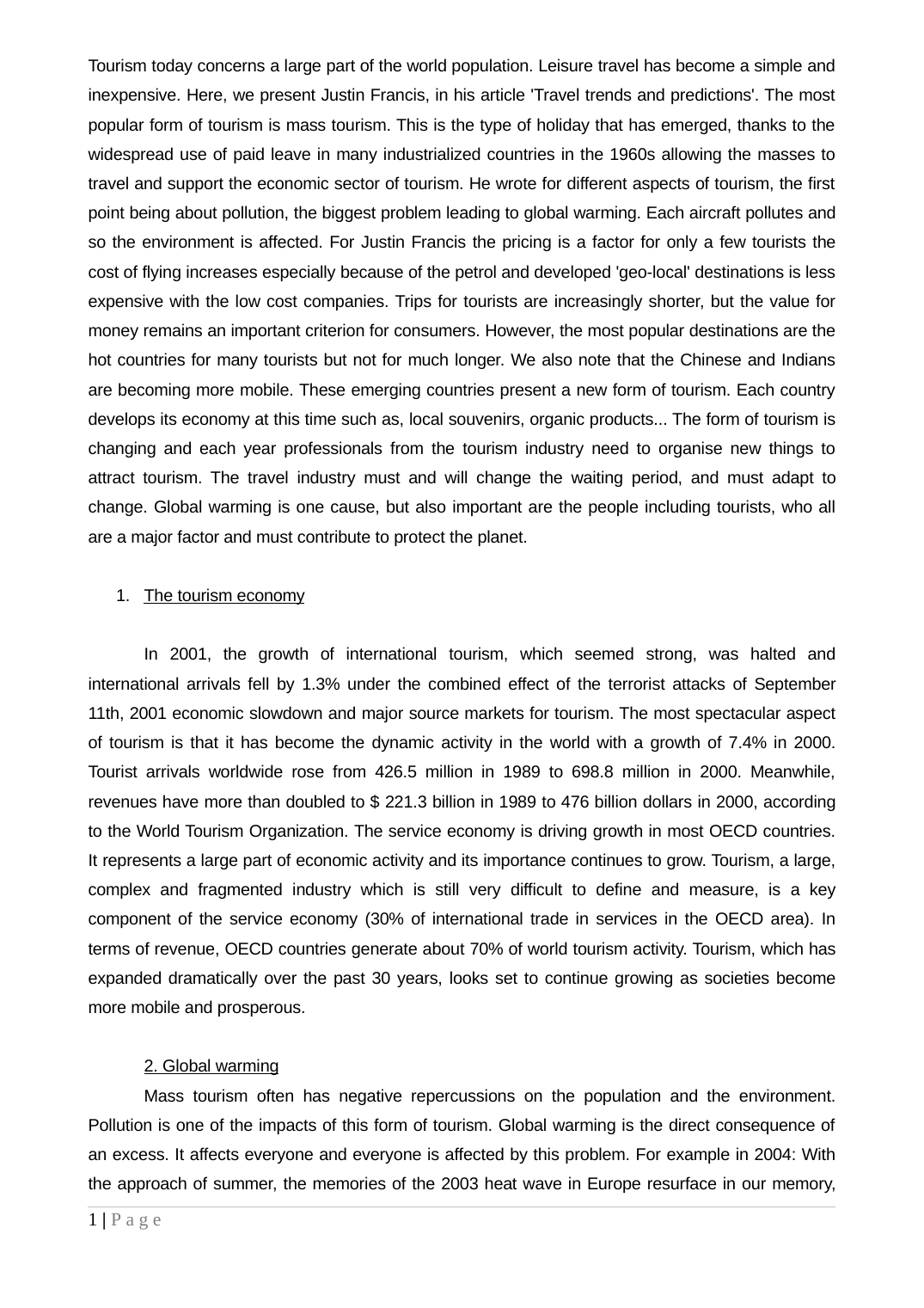Toursim Today
Publié le 17/05/2020

Extrait du document
«
Tourism today concerns a large part of the world population.
Leisure travel has become a simple and
inexpensive.
Here, we present Justin Francis, in his article 'Travel trends and predictions'.
The most
popular form of tourism is mass tourism.
This is the type of holiday that has emerged, thanks to the
widespread use of paid leave in many industrialized countries in the 1960s allowing the masses to
travel and support the economic sector of tourism.
He wrote for different aspects of tourism, the first
point being about pollution, the biggest problem leading to global warming.
Each aircraft pollutes and
so the environment is affected.
For Justin Francis the pricing is a factor for only a few tourists the
cost of flying increases especially because of the petrol and developed 'geo-local' destinations is less
expensive with the low cost companies.
Trips for tourists are increasingly shorter, but the value for
money remains an important criterion for consumers.
However, the most popular destinations are the
hot countries for many tourists but not for much longer.
We also note that the Chinese and Indians
are becoming more mobile.
These emerging countries present a new form of tourism.
Each country
develops its economy at this time such as, local souvenirs, organic products...
The form of tourism is
changing and each year professionals from the tourism industry need to organise new things to
attract tourism.
The travel industry must and will change the waiting period, and must adapt to
change.
Global warming is one cause, but also important are the people including tourists, who all
are a major factor and must contribute to protect the planet.
1.
The tourism economy
In 2001, the growth of international tourism, which seemed strong, was halted and
international arrivals fell by 1.3% under the combined effect of the terrorist attacks of September
11th, 2001 economic slowdown and major source markets for tourism.
The most spectacular aspect
of tourism is that it has become the dynamic activity in the world with a growth of 7.4% in 2000.
Tourist arrivals worldwide rose from 426.5 million in 1989 to 698.8 million in 2000.
Meanwhile,
revenues have more than doubled to $ 221.3 billion in 1989 to 476 billion dollars in 2000, according
to the World Tourism Organization.
The service economy is driving growth in most OECD countries.
It represents a large part of economic activity and its importance continues to grow.
Tourism, a large,
complex and fragmented industry which is still very difficult to define and measure, is a key
component of the service economy (30% of international trade in services in the OECD area).
In
terms of revenue, OECD countries generate about 70% of world tourism activity.
Tourism, which has
expanded dramatically over the past 30 years, looks set to continue growing as societies become
more mobile and prosperous.
2.
Global warming
Mass tourism often has negative repercussions on the population and the environment.
Pollution is one of the impacts of this form of tourism.
Global warming is the direct consequence of
an excess.
It affects everyone and everyone is affected by this problem.
For example in 2004: With
the approach of summer, the memories of the 2003 heat wave in Europe resurface in our memory,
1 | P a g e.
»
↓↓↓ APERÇU DU DOCUMENT ↓↓↓
Liens utiles
- Georgi Dimitrov par Liliana BrisbyEditor of " The World Today ", London Né en Bulgarie dans une famille d'ouvriers, Georgi Dimitrov est l'un desrares étrangers à avoir accédé aux plus hautes responsabilités au sein del'État soviétique.
- USA Today.


